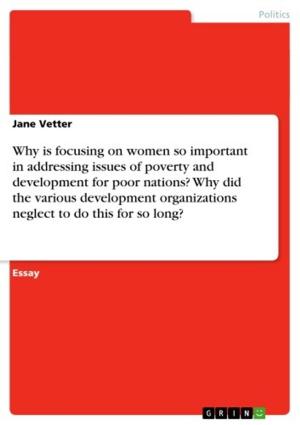| Author: | Torsten Teering | ISBN: | 9783638219709 |
| Publisher: | GRIN Publishing | Publication: | October 7, 2003 |
| Imprint: | GRIN Publishing | Language: | English |
| Author: | Torsten Teering |
| ISBN: | 9783638219709 |
| Publisher: | GRIN Publishing |
| Publication: | October 7, 2003 |
| Imprint: | GRIN Publishing |
| Language: | English |
Essay from the year 2002 in the subject Communications - Journalism, Journalism Professions, grade: 1 (A), Liverpool John Moores University (Medien), 8 entries in the bibliography, language: English, abstract: The late 1970s were a phase where the idea of strengthening anti-monopoly legislation became imminent but both the Labour and the Conservative government since 1977 ignored the advice from the Press Commission to strengthen it. This was the reason why the antimonopoly law in 1981 was ineffective and Rupert Murdoch was given permission to buy The Times and the Sunday Times. At this period Murdoch owned national daily newspapers with 30 per cent circulation of all British newspapers, and national Sunday newspapers with 31 per cent circulation. The take-overs have not even been referred to the Monopolies Commission (Curran, 1991). 1986 marked a big change for the press in Britain. The Employment Acts of 1980 and 1982 by the Conservative government weakened the power of the trade unions. Until this time the press owners were forced to accept that the unions were against new technologies, which would decrease the amount of workers, and which could strengthen the proprietor's role and financial success. It was Rupert Murdoch again who gained from this political change the most: In 1985 he built a new computerised printing plant in Wapping, while the union protested against the change. The members finally went on strike on January 24 th 1986, which gave Murdoch under the new Conservative employment law the right to dismiss the print workers without being required to give them expensive compensations. Murdoch lost only one day before his new system in Wapping produced the first newspaper editions because he transferred all technology while negotiating with the union. The new technology transformed the cost structure and increased the profitability of media companies (McNair, 1996). The economy of the 1980s changed to an 'Alliance capitalism' which made it possible that for example Murdoch's company News Corporation owned newspapers in the United States of America and the United Kingdom. These control and have directorial influence over the two biggest news agencies of the world Reuters and Associated Press which insist to be able to prevent any take-over. In the 1980s changing practises in particular of the entertainment industries with a few enormous multi-national companies dominating the market occurred. This decreased the competition and created oligopolies with industry sectors shared by a few global companies. A British example is again Rupert Murdoch owning Fox in America, Star TV in Asia and Sky in the UK (Paterson, 1998). [...]
Essay from the year 2002 in the subject Communications - Journalism, Journalism Professions, grade: 1 (A), Liverpool John Moores University (Medien), 8 entries in the bibliography, language: English, abstract: The late 1970s were a phase where the idea of strengthening anti-monopoly legislation became imminent but both the Labour and the Conservative government since 1977 ignored the advice from the Press Commission to strengthen it. This was the reason why the antimonopoly law in 1981 was ineffective and Rupert Murdoch was given permission to buy The Times and the Sunday Times. At this period Murdoch owned national daily newspapers with 30 per cent circulation of all British newspapers, and national Sunday newspapers with 31 per cent circulation. The take-overs have not even been referred to the Monopolies Commission (Curran, 1991). 1986 marked a big change for the press in Britain. The Employment Acts of 1980 and 1982 by the Conservative government weakened the power of the trade unions. Until this time the press owners were forced to accept that the unions were against new technologies, which would decrease the amount of workers, and which could strengthen the proprietor's role and financial success. It was Rupert Murdoch again who gained from this political change the most: In 1985 he built a new computerised printing plant in Wapping, while the union protested against the change. The members finally went on strike on January 24 th 1986, which gave Murdoch under the new Conservative employment law the right to dismiss the print workers without being required to give them expensive compensations. Murdoch lost only one day before his new system in Wapping produced the first newspaper editions because he transferred all technology while negotiating with the union. The new technology transformed the cost structure and increased the profitability of media companies (McNair, 1996). The economy of the 1980s changed to an 'Alliance capitalism' which made it possible that for example Murdoch's company News Corporation owned newspapers in the United States of America and the United Kingdom. These control and have directorial influence over the two biggest news agencies of the world Reuters and Associated Press which insist to be able to prevent any take-over. In the 1980s changing practises in particular of the entertainment industries with a few enormous multi-national companies dominating the market occurred. This decreased the competition and created oligopolies with industry sectors shared by a few global companies. A British example is again Rupert Murdoch owning Fox in America, Star TV in Asia and Sky in the UK (Paterson, 1998). [...]















